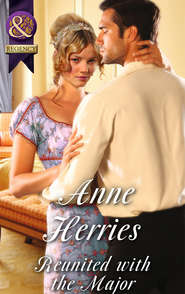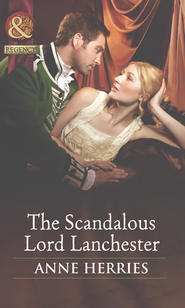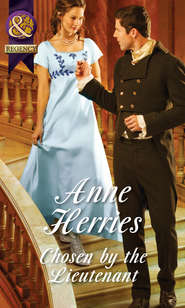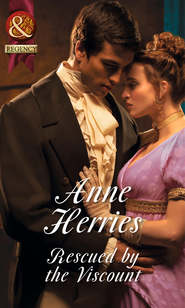По всем вопросам обращайтесь на: info@litportal.ru
(©) 2003-2024.
✖
The Disappearing Duchess: The Disappearing Duchess / The Mysterious Lord Marlowe
Настройки чтения
Размер шрифта
Высота строк
Поля
‘You do not know why she left?’
‘I have no idea. Of course, it may have no bearing on this matter.’
‘I do not see how it could.’
‘Then perhaps she will return when she is ready.’
‘I pray that you are right. I fear for her. I think she has very little money with her. I gave her some guineas for use while we travelled, but it was hardly enough to live on for the past two months, though she may have some jewels and a little money of her own, I suppose.’
Justin’s mind was torn between distress, anger and bewilderment. He had searched every day for the past few weeks, but there was no sign of his duchess. In his heart he had begun to think that she might be dead—why else had she not told him where she was or why she had gone? Had someone abducted her—or, worse, murdered her to be revenged on him? He could not think of anyone who hated him that much—but why else would she have been taken?
‘So, you would take her back—no matter the reasons for her disappearance?’
‘She is my wife,’ Justin said and looked at his friend, as if surprised at the question. He was a gentleman and a man of honour—what else could he do but take his wife back if she came to him in trouble? ‘I’ve been in hell these past weeks. Besides, it is my duty to care for her. If she is in distress, I shall help her, no matter what. I should thank God for her safe return and pray that I could make her happy.’
‘Then I shall go to London in the morning and employ an agent for you,’ Andrew said. He reached out to lay a hand on Justin’s shoulder. ‘Do not give up hope yet, my friend.’
* * *
Lucinda looked around the small kitchen and sighed. She had scrubbed the floor that morning before it was light; it was much cleaner than it had been when she first arrived, but nothing would make this hovel the kind of home in which she could bear to live. However, it was all she could afford, because she had spent the guineas her husband had given her as pin money.
If she had not run away, she might have been at Avonlea now. Lucinda felt her throat catch and a tear slid down her cheek. She brushed it away impatiently. Her husband must be so angry with her. When she’d discovered the blackmail letter lying on her dressing chest on her return from the church, she had fled in panic, taking only a few things rolled into a paisley shawl. How could anyone know her secret? It was more than five years since that terrible time when the shame had come upon her.
Her first thought had been for her husband’s good name. Avonlea was such a well-respected man and the realisation that she had brought a stain of dishonour to that proud family had almost overpowered her. She knew that he had married her because he’d believed her a girl of blameless past, modest, her reputation beyond reproach.
How she had deceived him! What a wicked thing she had done by marrying him without confessing the truth. She ought to have been resolute in refusing his obliging offer; at first, she had managed to keep a distance between them, but, as she became more attracted to him, she had found it too hard to resist the prompting of her heart. In the end she had fallen so desperately in love that she could no longer refuse Avonlea—yet she sensed he did not love her as she loved him. He spoke easily of love, but she thought it merely liking: the kind of feeling that might grow to warm affection with the years and the coming of children—but the spiteful letter would destroy his respect for her. He would hate her, wish to be free of the burden she must become to him when he learned the terrible truth.
Lucinda closed her eyes and sat down in the rocking chair by the kitchen fire, trying to control her thoughts. She had tried to block out the memory of that evil night when as a young girl she had been raped in her own room by a man she had thought her father’s trusted friend.
Warned that unless she kept silent her father would be ruined, Lucinda had said nothing until her condition had become noticed. It was a terrible misfortune that she had fallen with child so easily. When she tried to explain that she had been raped, but would not give the name of her seducer, her father had refused to listen. He had banished her to live with her strict grandmother in seclusion; when her child was stillborn, she had remained in seclusion until her father died. It was her punishment and he would not allow her to return home. Her mother had relented after her father’s death and allowed her to visit Harrogate with an aunt. It was there she had met Avonlea and begun to fall in love. She had kept her distance, because her shame was so terrible that no decent man would wish to marry her if he guessed that she had borne an illegitimate child.
‘Your father told you that you had forfeited the right to happiness,’ Mrs Seymour had told her when she mentioned the duke’s attentions. ‘I do not wish to deny you all the pleasures of life, Lucinda, but you must surely see that you can never marry?’
Because of her late father’s strictures and her mother’s doubts, Lucinda had kept Avonlea at a distance in Harrogate, but then, when they met again at the home of her great friend Jane Lanchester, she had taken the bold step of confiding in Jane, who had advised her that she must follow her heart and marry him.
Lucinda sighed as she looked around the cottage. It had hurt her so very much these past weeks to stay away from Avonlea, but the blackmail letter had told her something she had needed to confirm. Now she knew the truth and she was going to do something so daring that it frightened her.
She had fled from Avonlea in panic, not knowing what she meant to do, conscious only that she was not ready to confess the truth to a husband who had married her believing her beyond reproach.
In a state of absolute shock, she’d hardly known what to believe. Not only had the blackmailer known all of her intimate secrets, but also surprised her with the revelation that her infant hadn’t perished at birth, but was in fact even this day alive.
The blackmailer had threatened to reveal her shameful secret to the world unless she paid ten thousand pounds, but he or she had also offered to tell her where her child was living—in poverty and danger, the note had said, the words sending icy shivers down her spine.
At first resentful of the babe growing inside her, during the months of her confinement Lucinda had grown to love the idea of a child coming to life within her womb. Rejected by her family, with no one to love or care for her, she had talked to the babe, believing that when the child was born she would no longer be alone, but then after hours of pain and suffering she’d been coldly informed that the babe was dead. Lucinda had grieved for the child, but come to terms with her grief, banishing all the tainted memories to a tiny corner of her mind. She had told herself that the past no longer mattered to her—and then, suddenly, on the morning of her wedding to the duke, to learn that her child was alive!
Her mother had lied to her. The distress of learning the extent of her parent’s cruelty had completely overset her. Instead of going to Avonlea and throwing herself on his mercy, as she might had she been certain of his feelings, she had thought only to run away. Better that she simply disappear than bring shame to him.
At first the shock had been so great that Lucinda could hardly take it in; then, seized by sudden panic and the need to know the truth, she’d taken an old gown and some trinkets and fled through the gardens. In confusion, with only a vague idea of what she meant to do, she set out for her family home. She was weeping, in terrible confusion and pain as she fled, unable to think coherently. It was only in the long lonely days and nights that followed that she’d begun to think about what she was doing—to discover her feelings about the child she’d believed dead.
Lucinda had arrived at her mother’s home some ten days later, having begged lifts for some of the journey, but walking much of it. After first making her escape, she’d changed into her old gown. She’d hidden her beautiful silk wedding gown behind some hay bales in a barn at the edge of the Avonlea estate; carrying only a small bundle, she had continued her journey wearing a plain grey gown more suited to a governess than the duchess she’d become. No one had given her so much as a second glance. When she finally arrived home, her mother had greeted her with a sour look. Mrs Seymour had refused to attend her daughter’s wedding on the grounds of ill health, though her true reason was that she did not approve of Lucinda marrying anyone.
‘So you’ve come to your senses. It was a stupid thing to do, Lucinda. I suppose he threw you out?’
‘Avonlea knows nothing,’ Lucinda replied. Shaking with anger, she had thrust the letter under her mother’s nose. ‘Where is she, Mama? Where is my daughter? The child you stole from me—the child you told me was dead?’
Her mother’s face had turned pale. At first she had continued to refute her daughter’s accusation. For ten days she had tried to deny all knowledge of the child, swearing it had died at birth and that she knew nothing. Lucinda had questioned her relentlessly, never giving her a moment’s peace, and in the end she’d broken down in tears.
‘Your father would not let you keep the babe. He took it to a workhouse and…I believe she was adopted by a childless couple.’
‘Tell me their names, Mama.’
Mrs Seymour shook her head. ‘I know no more. I swear he told me nothing.’
‘Very well, give me the name of the workhouse.’
‘It will do little good after all this time.’
‘Tell me what I wish to know and I shall leave you in peace. Deny me and I shall continue to question and demand. I am no longer the frightened child I was when I was so cruelly abandoned by you.’
‘It was not my wish—but your shame had to be hidden.’
‘Why? Had you loved me as a mother should, you could have taken me away, perhaps abroad, and let me keep my babe. We might have found an honest living somehow.’
‘Why do you care about the child if you were raped, as you claim?’
‘How could you doubt me?’ Lucinda looked at her sadly. ‘The man who used me so cruelly was a monster and if my father had stood by me, he might have been punished—but Papa preferred to believe his friend’s lies. He, I hate—but my child is innocent. Mama, can you not see that I need to see my child? The knowledge that she lives is tearing at my heart. I shall never be at peace until I know how she is.’
‘What will you do if you find her?’
‘I am not certain—but I must know she is well and happy. Can you not see that I should never rest easy if I simply left her to her fate?’
‘I do not…’ Mrs Seymour’s eyes dropped in shame.
In the end she’d given her daughter all the details she had. Lucinda had left the house that same day.
It had taken her two weeks of travelling, often on foot, to find the workhouse and another week before she could persuade the woman in charge to tell her the names of the couple who had taken her daughter.
‘You understand that I told you nothing,’ she said and looked at the silver locket and ruby brooch lying in her hand. ‘Your father told us to have the brat adopted and Mrs Jackson had none of her own then.’
‘She has other children now?’
‘Aye, they come like that. She has four of them under the age of four and more than she can manage. She’ll likely be glad to get rid of Susan.’
‘You called my daughter Susan?’ The woman nodded. ‘Thank you, madam. Now will you kindly tell me where to find my daughter?’
‘You’ll find the family at the sign of the Cock’s Spur.’
‘Mrs Jackson and her husband run a hostelry?’











